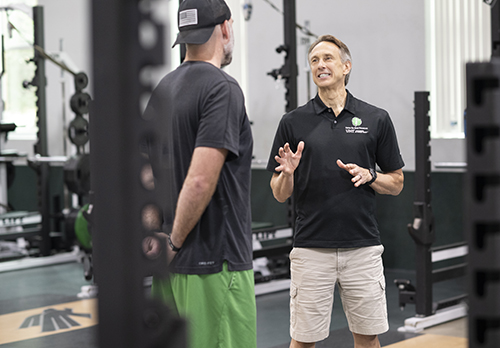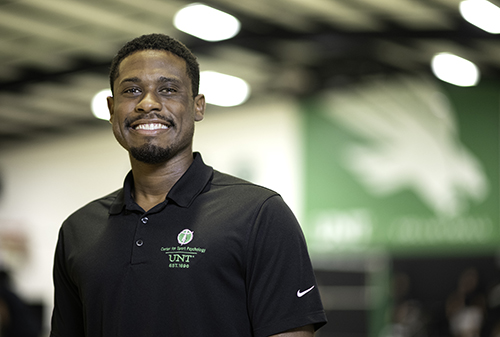
DENTON (UNT), Texas — Since 1998, the Center for Sport Psychology and Athlete Mental Health at the University of North Texas has provided mental health care and sport performance services to athletes in the
Dallas-Fort Worth area.
“We’re focused on helping athletes and other performers, such as dancers or esports
players, reach their optimal levels of performance. That includes their overall psychological
well-being, as well as achieving peak performance in their sport,” said Trent A. Petrie,
center director and professor in UNT’s Department of Psychology. “Everything we do is about creating greater connections amongst teams and within
organizations.”
The center is staffed by doctoral students pursuing degrees in counseling psychology,
specifically those focusing on sport psychology. These students serve as sport psychology
consultants, providing mental health care and support services to clients. They are
trained to address mental health concerns such as anxiety, depression and eating disorders,
while also helping clients with performance improvement, pre-performance routines
and goal-setting. Additionally, second-year master’s students from UNT’s Department of Kinesiology, Health Promotion and Recreation are part of the Center’s staff, though their work is focused on individual athlete
and team performances.
Each UNT Athletics team, along with the North Texas Cheerleaders and North Texas Dancers, has a dedicated sport psychology consultant. The center also partners with other institutions,
including Texas Woman’s University (TWU), the University of Texas at Arlington and
private high schools in the Dallas area. The Dallas Wings, a professional women’s
basketball team in the WNBA, are among the teams that utilizes the center’s services.

In addition to serving institutions and individuals, the center prepares consultants for careers in sports psychology, with 95% of its students aiming to work with athletes and teams at the collegiate or professional levels. Mikaili Robertson, a counseling psychology doctoral student in the sport psychology cluster and the consultant for the UNT women’s volleyball team, said, “It’s a unique program where I’ll be a licensed psychologist by the time I graduate — getting training, clinical experience and assessments with community members and athletes.”
Doctoral students complete a thesis, dissertation and grant-funded research projects. Robertson’s current research focuses on Black student athletes’ mental health in Division 1 ‘Power Five’ schools, which are institutions competing in the five major NCAA conferences: the Atlantic Coast Conference, Big Ten Conference, Big 12 Conference, Pacific-12 Conference and Southeastern Conference.
“It’s a special environment where everyone collaborates toward a common goal,” Robertson said. “I’m really grateful for the opportunity to partner with others to make the athlete’s experience the best it can be.”
Sandee Mott, TWU executive director of athletics, has seen significant benefits from their partnership with the center since 2020.
“Embedding a sport psychology consultant has led to remarkable successes and valuable data,” she said.
With the center’s help, TWU provides annual mental health screenings for student-athletes, along with one-on-one sessions and team sessions, drop-in hours, and the Bodies in Motion program, which addresses body image and disordered eating. Mott emphasized that the partnership has reduced the stigma around mental health care.
“Trust is crucial. Our consultants have built strong relationships with athletes, coaches and staff, making that connection invaluable.”
To learn more about the Center for Sport Psychology and Athlete Mental Health, or to request services, call the clinic office at (940) 369-7767 or send an email to sportpsych@unt.edu.
UNT News Service Phone Number: (940) 565-2108
Media Contacts:
Bess Whitby
Bess.Whitby@unt.edu
940-565-3513